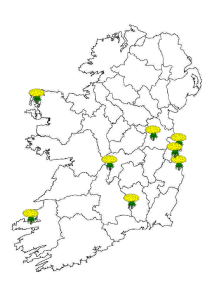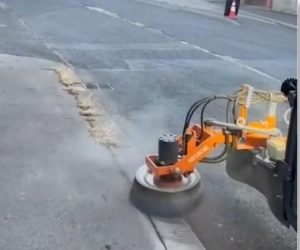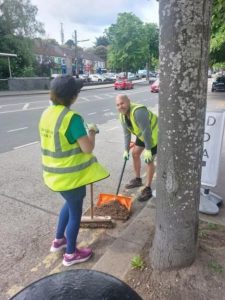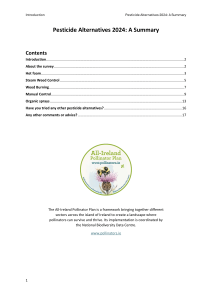Pesticides are potent chemical cocktails that can kill, harm and disorientate pollinators. The All-Ireland Pollinator Plan encourages everyone to eliminate pesticides for the benefit of pollinators and biodiversity. Plants that are considered ‘weeds’, such as Dandelions, are often hugely valuable sources of nectar and pollen, and should be celebrated.
All over the island of Ireland, communities are reducing their use of pesticides, and many have eliminated them altogether. This is reflective of the fantastic work taking place to change the way we manage our landscape for pollinators. Some community groups are recognised and rewarded for their work in annual pollinator awards, including the Tidy Towns Pollinator Award which is administered by the Local Authority Heritage and Biodiversity Officer network and the National Biodiversity Data Centre. This award is given to groups who have taken action for pollinators in line with the recommendations of the All-Ireland Pollinator Plan, including reducing and eliminating pesticides.
Below are examples of some of the Tidy Towns groups who have scored full marks for eliminating pesticides in recent years, and how they managed to achieve it.

Athboy Tidy Towns
Athboy Tidy Towns in Meath have long been leading the way in pesticide elimination. With the help of a LEADER grant, they purchased a hot foam machine in November 2020. Hot foam is a method of controlling unwanted plants by trapping hot water under a layer of foam, extending the time they are exposed to high temperatures.
Meath County Council agreed to store the machine and use it on public areas. Hot foam can be difficult to use effectively as it is important to apply it at the right time, so to assist in this process, Athboy Tidy Towns organised a successful scuffling event in April 2025 with the help of other groups.
Baile Slachtmhar Bhéal an Mhuirthead/ Belmullet Tidy Towns
Belmullet Tidy Towns in Co. Mayo haven’t used herbicides in several years. In areas where it is necessary to remove unwanted plants they do so by hand, use a gas burner, or apply coarse salt and white vinegar. They have also increased roadside sweeping to prevent soil building up and weeds seeding. Signage throughout the town explains that pesticides are no longer used, helping raise awareness of these activities.
Whilst the group have eliminated pesticides in their own activities, they are aware that some residents continue to do so on their own properties. Working with Mayo County Council they hope to run a publicity campaign to make more people aware of how pesticide use can harm pollinators and human health.
Castlegregory Tidy Towns
Castlegregory Tidy Towns in Co. Kerry use no pesticides in their own work, and have encouraged one local farm and ten private households committed to not using pesticides in the village. Working with Kerry County Council, they have persuaded the council to implement a no spray policy in the village, with no pesticides sprayed on village streets in 2024.
To manage unwanted plants, the group have an annual weeding plan, which clearly lays out which areas are scheduled for management and is a joint document shared with Kerry County Council. They also run an annual village blitz, involving the community in manual weed removal such as hoes, wire brushes, scrapers and spades.
Crinkill Tidy Villages
Crinkill Tidy Villages in Co. Offaly have taken steps to phase out the use of pesticides in all public spaces under their care. This includes community-managed green spaces, flower beds, paths, and around village signage.
Unwanted plants are removed by hand or with handheld tools. CE scheme and Tús workers, as well as volunteers, carry out regular maintenance of kerbs, footpaths, and flower beds. They also use organic bark mulch, donated by a local tree surgeon, to suppress weed growth around trees, hedges, and perennial beds, and dense planting to reduce the areas of bare soil where unwanted plants might take hold. In areas where persistent weeds return, the group uses boiling water or a vinegar solution as a non-toxic alternative.
As a result, their green spaces now support a wider range of wildflowers and insect life, costs associated with chemical purchases have significantly reduced, public perception has shifted, with increased appreciation for natural, low-intervention landscapes, and children and pets now enjoy safer, chemical-free public spaces.
Dalkey Tidy Towns
In 2018, Dun Laoghaire-Rathdown County Council adopted a pesticide-free approach to weed control on roads and streets. Dalkey Tidy Towns assist in late spring and summer with their ‘Gleamers’ litter picking team doubling as manual weed control. Their most effective method is weeding by hand in paved, high-footfall areas in the town centre. Hoes and rakes are used for gravel areas, spades are used to remove kerbside weeds and a brush is used to sweep them up. They also spread mulch on appropriate flowerbeds to prevent the growth of unwanted plants. The council also have a “Multihog” weeding machine which is followed by a mini-sweeper to collect debris.

Raheny Tidy Village Group
Raheny Tidy Village Group in Dublin mainly rely on manual weed removal, hand-pulling and physically removing weeds in all flowerbeds, planters, grass margins, and community spaces. To assist with larger areas and reduce physical strain, they use a specially designed Weedex machine, which mechanically removes weeds without the use of chemicals. Regular inspections allow early intervention to prevent weed spread, reducing the need for more
aggressive control methods.

Tullahought Tidy Towns
Tullahought Tidy Towns in Kilkenny has a policy to not use herbicides or pesticides in the village. They use manual methods for removing unwanted planted in flower beds and containers, and bark mulch to suppress plant growth in managed beds. They have also used a new weed burner torch to help remove plants growing in cracks in concreted areas. Perhaps most impressively, they have worked with the local residents in the village and secured agreement not to spray the areas outside their houses and properties to protect both the growing vegetation and the nesting habitat for pollinators and other insects provided by stone walls.
Eliminating pesticides
Peer-reviewed research into pesticide alternatives is ongoing, but the move away from pesticides is happening now, and the need to eliminate harmful chemicals is urgent.
In 2024, the All-Ireland Pollinator Plan ran a survey ‘Pesticide Alternatives’. It was sent to a range of supporters and partners to the Pollinator Plan and was also made available to the general public. The survey received 82 anonymized responses and was completed by a range of different groups and individuals across the island of Ireland, including local authorities, community groups, Tidy Towns, group water schemes, landscape contractors and individuals.
The aim of the survey was to gather information on pesticide alternatives currently being used on the island of Ireland, how effective they are, and the challenges of using them. The survey focused on five common pesticide alternatives: hot foam, steam weed control, weed burning, manual control, and organic sprays.
The results of this survey do not constitute recommendations by the All-Ireland Pollinator Plan, which must be evidence-based and backed up by science. Rather, the intention of this summary is to share the learnings of the survey and the lived experiences of pesticide alternatives on the island of Ireland to help people make more informed decisions when choosing alternatives to pesticides.
Read the survey summary report here: Pesticide Alternatives Survey Summary

